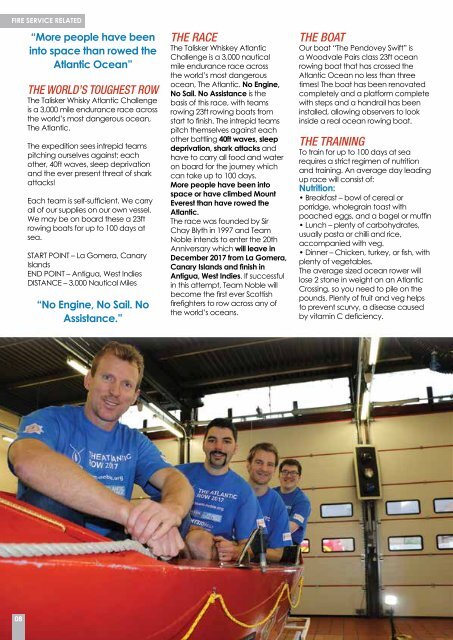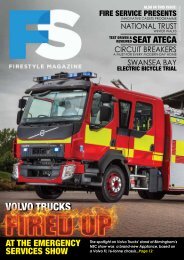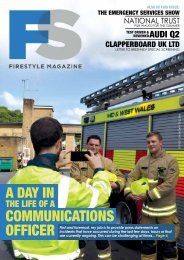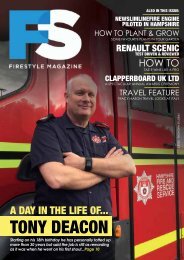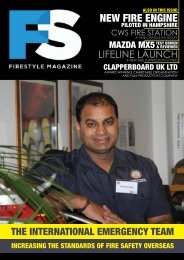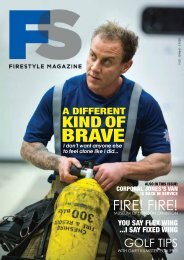Firestyle Magazine: Issue 5 - Autumn 2016
Welcome to the Firestyle Magazine – The Magazine for the 21st Century Fire and Rescue Services Personnel. Please visit our website for more: http://firestylemagazine.co.uk
Welcome to the Firestyle Magazine – The Magazine for the 21st Century Fire and Rescue Services Personnel. Please visit our website for more: http://firestylemagazine.co.uk
Create successful ePaper yourself
Turn your PDF publications into a flip-book with our unique Google optimized e-Paper software.
FIRE SERVICE RELATED<br />
“More people have been<br />
into space than rowed the<br />
Atlantic Ocean”<br />
THE WORLD’S TOUGHEST ROW<br />
The Talisker Whisky Atlantic Challenge<br />
is a 3,000 mile endurance race across<br />
the world’s most dangerous ocean,<br />
The Atlantic.<br />
The expedition sees intrepid teams<br />
pitching ourselves against; each<br />
other, 40ft waves, sleep deprivation<br />
and the ever present threat of shark<br />
attacks!<br />
Each team is self-sufficient. We carry<br />
all of our supplies on our own vessel.<br />
We may be on board these a 23ft<br />
rowing boats for up to 100 days at<br />
sea.<br />
START POINT – La Gomera, Canary<br />
Islands<br />
END POINT – Antigua, West Indies<br />
DISTANCE – 3,000 Nautical Miles<br />
“No Engine, No Sail. No<br />
Assistance.”<br />
THE RACE<br />
The Talisker Whiskey Atlantic<br />
Challenge is a 3,000 nautical<br />
mile endurance race across<br />
the world’s most dangerous<br />
ocean, The Atlantic. No Engine,<br />
No Sail. No Assistance is the<br />
basis of this race, with teams<br />
rowing 23ft rowing boats from<br />
start to finish. The intrepid teams<br />
pitch themselves against each<br />
other battling 40ft waves, sleep<br />
deprivation, shark attacks and<br />
have to carry all food and water<br />
on board for the journey which<br />
can take up to 100 days.<br />
More people have been into<br />
space or have climbed Mount<br />
Everest than have rowed the<br />
Atlantic.<br />
The race was founded by Sir<br />
Chay Blyth in 1997 and Team<br />
Noble intends to enter the 20th<br />
Anniversary which will leave in<br />
December 2017 from La Gomera,<br />
Canary Islands and finish in<br />
Antigua, West Indies. If successful<br />
in this attempt, Team Noble will<br />
become the first ever Scottish<br />
firefighters to row across any of<br />
the world’s oceans.<br />
THE BOAT<br />
Our boat “The Pendovey Swift” is<br />
a Woodvale Pairs class 23ft ocean<br />
rowing boat that has crossed the<br />
Atlantic Ocean no less than three<br />
times! The boat has been renovated<br />
completely and a platform complete<br />
with steps and a handrail has been<br />
installed, allowing observers to look<br />
inside a real ocean rowing boat.<br />
THE TRAINING<br />
To train for up to 100 days at sea<br />
requires a strict regimen of nutrition<br />
and training. An average day leading<br />
up race will consist of:<br />
Nutrition:<br />
• Breakfast – bowl of cereal or<br />
porridge, wholegrain toast with<br />
poached eggs, and a bagel or muffin<br />
• Lunch – plenty of carbohydrates,<br />
usually pasta or chilli and rice,<br />
accompanied with veg.<br />
• Dinner – Chicken, turkey, or fish, with<br />
plenty of vegetables.<br />
The average sized ocean rower will<br />
lose 2 stone in weight on an Atlantic<br />
Crossing, so you need to pile on the<br />
pounds. Plenty of fruit and veg helps<br />
to prevent scurvy, a disease caused<br />
by vitamin C deficiency.<br />
08


